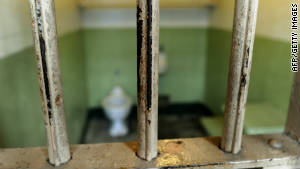Editor's note: John D. Sutter is a human rights and social change columnist for CNN Opinion. E-mail him at CTL@CNN.com or follow him on Twitter (@jdsutter), Facebook or Google+.
(CNN) -- The 17-year-old drew his suicide note in strips of wet toilet paper on the floor of his jail cell -- a concrete box where he was being held in isolation.
"I'm sorry 1 4 3 fam," Kirk Gunderson wrote.
Code for "I love you, family."
It's impossible to know what, exactly, pushed Kirk to tie a prison blanket to a smoke detector grate and hang himself on December 27, 2005. But Vicky Gunderson -- who remembers her son for his bright laugh and caring temperament and who described his suicide note and cell to me -- believes Kirk lost hope and the will to live when he was transferred from a regular cell at a county jail in Wisconsin into solitary confinement.
 John D. Sutter Become a fan of CNNOpinion Stay up to date on the latest opinion, analysis and conversations through social media. Join us at Facebook/CNNOpinion and follow us @CNNOpinion on Twitter. We welcome your ideas and comments.
John D. Sutter Become a fan of CNNOpinion Stay up to date on the latest opinion, analysis and conversations through social media. Join us at Facebook/CNNOpinion and follow us @CNNOpinion on Twitter. We welcome your ideas and comments. When he took his life, Kirk was awaiting a court hearing for stabbing his dad and brother. He was addicted to Oxycontin and had suffered nine or 10 concussions from playing sports, Vicky Gunderson said, and was likely in some kind of altered state at the time. She said the family had forgiven him for the attack.
Her son was transferred to solitary confinement, according to jail records she provided, because he was hiding materials that could be used in self-tattooing, which put him in violation of the jail's rules.
Kirk killed himself only hours later.
"We needed the justice," she said, "(but) not at expense of his life."
She's dedicating her time to ending solitary confinement. She firmly believes that her son would be alive in jail today if he hadn't been locked up alone.
"Seriously, would you lock up your animals and never let them see sunshine?" she asked me during a recent interview. "Would you lock up your children and never let them get a breath of fresh air? And that's what it is. I don't care who you are. I don't think you deserve to be in solitary confinement."
I don't either. And I bet most reasonable Americans would agree.
The problem is that many aren't aware of what's happening.
 Tommy Silverstein drew this image of his solitary confinement cell in Colorado.
Tommy Silverstein drew this image of his solitary confinement cell in Colorado.  'Forgotten' inmate awarded $15 million
'Forgotten' inmate awarded $15 million  Raising alarm on solitary confinement
Raising alarm on solitary confinement  Living in solitary confinement
Living in solitary confinement With relatively little outrage, the United States has become the world capital for solitary confinement. Kids, immigrants, people with mental illness -- all can be subjected, somewhat regularly, to solitary lockdown, according to human rights groups and news reports. Between 20,000 and 80,000 people are thought to be held in solitary confinement on any given day in the United States, making the practice more common here than in any other country, said Juan Mendez, the United Nations' special rapporteur on torture and other forms of cruel punishment.
"The U.S. leads the pack by a long, long shot," he told me.
In solitary -- also called "the box" and "the hole" by prisoners, or euphemistically, "segregation" and "special housing" by corrections officials -- inmates have virtually no social contact, except for occasional transactions with guards. They're kept in isolation for 22 to 24 hours a day, usually coming out only to exercise.
There's no conversation. No interaction. Often, no books or TV. Inmates have described the "patterns" that their feet wear into concrete floors from pacing back and forth for days, weeks, months -- years, in some cases.
It strips them of their humanity. Many of these people will be put back into society. The most self-interested way to think about the issue is to consider whether you would want to be neighbors with someone who had been held in isolation.
After hearing some of their stories, I wouldn't.
The practice doesn't rehabilitate. It punishes, cruelly.
"All you have is your brain," Brian Nelson told me.
The 48-year-old, who now lives in Chicago and is the prison rights coordinator for the Uptown People's Law Center, said he spent a total of 23 years in solitary confinement, 12 years consecutively, most of it without TV or a radio. Nelson was convicted at 17 of armed robbery and murder. In lockdown, he made somewhat futile attempts to pass the time, copying the full text of the Bible (it took one year, nine months and two days), and pacing for 18 hours a day. "I paced so much that they would take me out and cut the blood blisters off the bottom of my feet," he said.
The feeling of being in solitary is almost impossible for him to describe.
"I ask everyone (who asks about solitary confinement) to give up their cellphones, their TVs, everything, for a weekend, and then lock themselves in the bathroom," he told me. "Most of the people who try it come out after a few hours. They're like, 'No.' "
About two years after being let out of prison, he said he's still jumpy when people come close. At first, he isolated himself even from family members, staying in a basement. "No one was sure if I would be able to come out of that cell and be part of the family," he said. "Cell," in this case, seems to refer to the one in his mind.
"I would rather have you beat me with sticks -- I would rather have you beat me than put me in solitary," he said.
Sadly, there are plenty of other stories like his.
"I really felt myself losing my mind, you know. I had a fly in my cell for two days and I was sitting there talking to this fly. It was like a person," said 37-year-old Five Omar Mualimmak, who said he was in solitary confinement for about five years. When the fly disappeared from the cell, he told me, he broke down in tears.
"I've experienced times so difficult and felt boredom and loneliness to such a degree that it seemed to be a physical thing inside so thick it felt like it was choking me, trying to squeeze the sanity from my mind, the spirit from my soul, and the life from my body," one New York inmate, William Blake, wrote in an essay posted by SolitaryWatch.com.
"You know, I haven't been outside for 13 years. I haven't seen sunlight or felt the wind or seen the sky, except outside my cell window, for 13 years now," another man, Justin Rueb, says in a National Geographic documentary. He later adds, frighteningly: "My thought processes aren't quite the same as they used to be. I feel myself wanting to hurt people now. Those are never feelings I had before."
Remember the American hikers who were jailed in Iran? One of them, Shane Bauer, visited a solitary cell in the United States to do a piece for Mother Jones. In some ways, he wrote, U.S. conditions appeared to be worse than what he experienced during four months of solitary confinement in Iran.
"For hours, days, I fixated on the patch of sunlight cast against my wall through those barred and grated windows," Bauer wrote of his time in Iran. "When, after five weeks, my knees buckled and I fell to the ground utterly broken, sobbing and rocking to the beat of my heart, it was the patch of sunlight that brought me back. Its slow creeping against the wall reminded me that the world did in fact turn and that time was something other than the stagnant pool my life was draining into.
"Here, there are no windows."
These horrors aren't limited to adults.
I recently spent some time on the phone with Ian Kysel, the Aryeh Neier fellow at the American Civil Liberties Union and an author of a 2012 report on the solitary confinement of minors in jails and prisons across the United States.
"The only thing left to do is go crazy -- just sit and talk to the walls," one adolescent in Florida told the researchers. "I catch myself (talking to the walls) every now and again. It's starting to become a habit because I have nothing else to do. I can't read a book. I work out and try to make the best of it. But there is no best."
Another made up an imaginary friend just to have someone to talk to, he said.
The youngest person he spoke to was 13 at the time of incarceration. Some of the kids he interviewed referenced hallucinations, suicidal thoughts and self-harm, all driven by the fact that they were so utterly and torturously alone under these conditions.
The U.S. version of solitary started long ago -- with the Quakers, surprisingly enough, at Pennsylvania's Eastern State Penitentiary. It opened in 1829 and was based on the philosophy that isolating inmates gave them a useful opportunity to get closer to God and to offer penitence (like "penitentiary," get it?) for their crimes.
In practice, the prisoners went mad.
"I hold this slow and daily tampering with the mysteries of the brain, to be immeasurably worse than any torture of the body," Charles Dickens wrote in the 1840s after he visited that Philadelphia prison, which is now a museum. "And because its ghastly signs and tokens are not so palpable to the eye and sense of touch as scars upon the flesh; because its wounds are not upon the surface, and it extorts few cries that human ears can hear; therefore the more I denounce it, as a secret punishment which slumbering humanity is not roused up to stay."
"Secret punishment."
"Slumbering humanity."
Some 170 years later, it's time to wake up.
There are signs that's already happening.
The Federal Bureau of Prisons has launched a review of its use of solitary confinement -- a process a spokesman told me should take about a year to complete. (In an e-mailed statement, spokesman Chris Burke said some inmates must be isolated to keep prisons safe. "Usually such removal continues for only brief periods of time until the disruptive inmate can demonstrate his or her ability to refrain from misconduct within the institution," he said. "And only a very small subset of the population are housed away from the general population at any point in time.")
Florida also is considering legislation to limit the practice for minors.
Mendez, the U.N. special rapporteur, has called solitary confinement torture. The practice, he said, should be banned for minors and people with mental illness. In rare and extreme cases, he said, it should be used for no longer than 15 days.
Vicky Gunderson, whose son killed himself in solitary, is asking people to sign an online petition telling the U.S. attorney general to ban solitary confinement for inmates 17 and younger. "He didn't deserve to have hope taken away," she said of her son.
Hers seems like one of the most reasonable requests a still-grieving mom could make.
And it's one we should be hard-pressed to ignore.
Follow us on Twitter @CNNOpinion
Join us on Facebook/CNNOpinion
{ 0 comments... read them below or add one }
Post a Comment